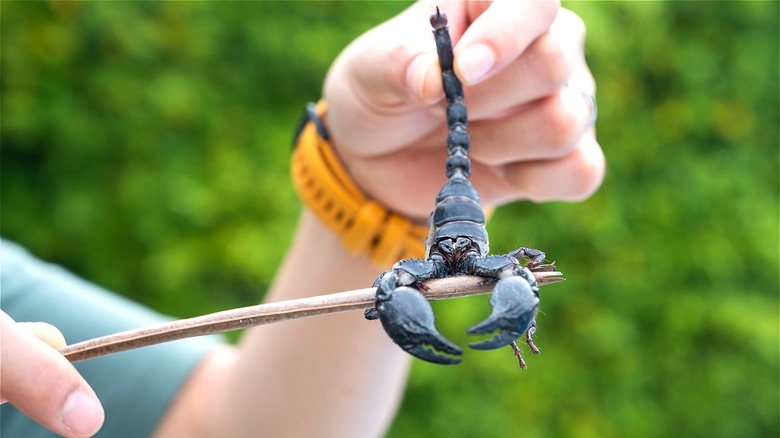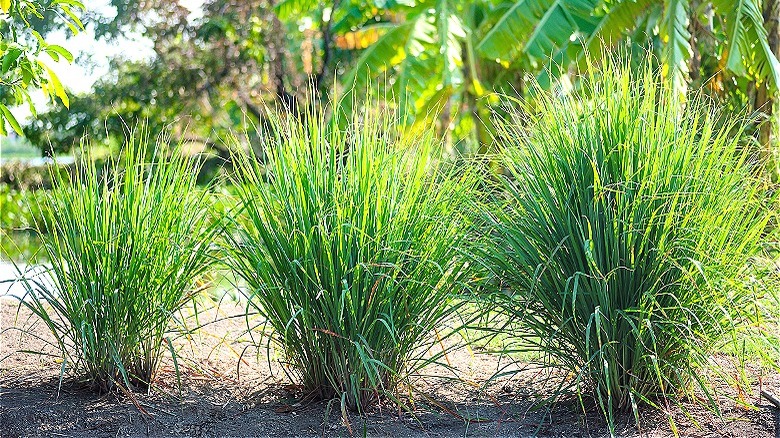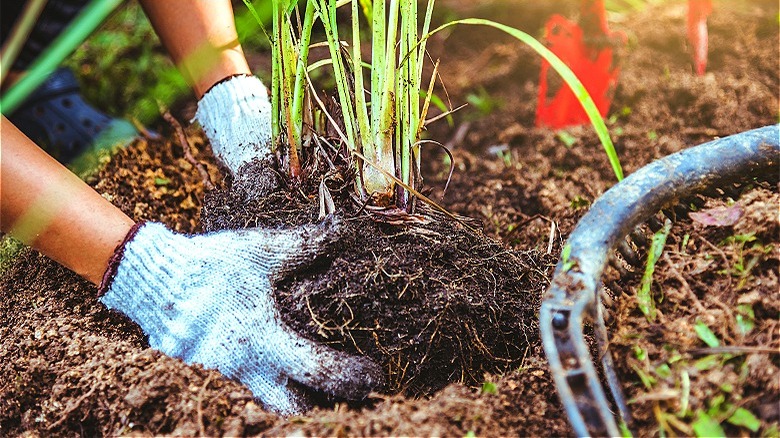Add This Popular Herb To Your Garden To Ward Off Scorpions
If you've discovered scorpions in your garden or just want to ensure they know they're not welcome, consider planting lemongrass. It's one of the best natural ways to keep many pests, especially scorpions, out of your space because this popular herb contains citronella oil, a natural insect repellent.
Lemongrass has a nice punch of citrus flavor, making it an excellent choice for a hot tea or an addition to an Asian-inspired sauce. It's not all that difficult to grow either since it does well growing in the ground in flowerbeds or in flower pots placed where you need to ward off pests. Typically, this plant reaches a height of about 3 to 5 feet, making it a nice, showy piece in your garden landscape as well. Once placed, it will require moderate care and updating but allows for a few snips here and there to use in your favorite culinary dish.
If the troublesome area of your yard is in full sun and temperatures are pretty warm most of the year, lemongrass could be exactly what you need to keep these critters at bay. It does require moist soil that drains well. Consider placing several of these plants, about 18 to 24 inches apart, along the edge of your garden as a nice way to discourage scorpions through a natural barrier-like protection.
Using scent to deter scorpions from your garden
Lemongrass's power against scorpions has to do with its scent. Because it contains citronella, this plant has a naturally, somewhat strong scent that deters many pests. For example, you might buy citronella candles for your backyard to keep mosquitos away, and they work in the same way that lemongrass can for scorpions. The difference is that, unlike candles that have varied levels of citronella in them, and often other chemicals as well, lemongrass has a higher concentration of citronella oil, which allows it to work a bit better.
Scorpions use their very acute sense of smell to seek out food sources, often targeting their prey from some distance. However, if lemongrass is present, the odor is strong enough to hide that scent, and, ultimately, encourage the scorpion to go the other way in its search. Like most pests, scorpions spend much of their days searching for food, and if they can't smell anything enticing in your garden, chances are good they'll look elsewhere.
This said, if scorpions are already in your garden, you'll have a hard time using lemongrass to get them out of the area as a sole solution. However, lemongrass can work in combination with other strategies to help you create a scorpion-free garden space.
How to use lemongrass in your garden
You can plant lemongrass from small seedlings or start growing the culinary herb from seeds inside during the spring. Once there's no threat of frost, plant these ornamental grass-like plants throughout your garden or along the edges of it, creating a border around the space you wish to keep scorpions from entering. Encourage growth with routine watering and lots of available nutrients in the soil. Add in some organic material over time to support the plant's growth.
Lemongrass's herbal benefits become available once it reaches about a foot tall. At that point, the stalk should be approaching 1 inch in diameter, allowing you to trim off a few pieces to use in your food. However, to maintain the scorpion benefits, you'll need to leave a substantial amount of the plant intact and growing. To boost the repellent effectiveness of lemongrass, keep your garden free of debris and food scraps that may attract scorpions and other pests. You can also add to your garden by planting lavender around the border as another natural deterrent.
If you don't have enough room to dedicate to lemongrass plants, consider making a spray out of about 8 ounces of water and five to 10 drops of lemongrass essential oil. Spray this solution along the base of your existing garden plants or along the garden's border. You'll need to do this consistently to ward off scorpions, but if you do it enough, you'll have less risk of stings in your planting area.


